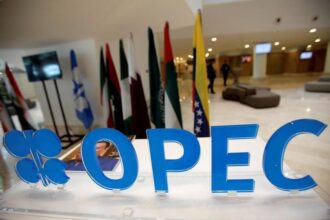By Nicole Jao
NEW YORK (Reuters) – Oil prices settled lower on Thursday after Angola said it would exit the Organization of the Petroleum Exporting Countries (OPEC), raising questions about the producer group’s efforts to support prices by limiting global supplies.
futures settled down 31 cents at $79.39 a barrel. U.S. West Texas Intermediate crude futures fell 33 cents to $73.89 a barrel.
Earlier in the session, both benchmarks were down by more than $1 after Angola said it was planning to leave the group.
Angolan oil minister Diamantino Azevedo said the country’s membership in OPEC was not serving its interests. The Saudi-led producer group in recent months has been rallying support to deepen output cuts and boost oil prices.
“It seems like OPEC is losing the battle to keep prices higher,” said Matt Smith of shipping tracking firm Kpler, noting that non-OPEC producers like the U.S. have stepped up to fill the supply gap.
Angola produces around 1.1 million barrels per day (bpd), compared with 28 million bpd for the whole group.
The country’s exit raises questions about the cohesion and direction of OPEC, even though it is one of the smallest producers and its departure may have a limited impact on global supplies, Smith said.
At a meeting in November, Angola had protested a decision by OPEC to cut its production quota for 2024 to help prop up oil prices.
Separately, the U.S. Energy Information Administration (EIA) said output rose to a record 13.3 million barrels per day (bpd) last week, up from the previous all-time high of 13.2 million barrels per day.
“The U.S. is poised to increase production in the Permian Basin and across the country,” said Tim Snyder, economist at Matador Economics in Dallas.
“We’ve mitigated price risk here in the U.S. and really put the Russians and the Saudis back on their heels,” Snyder said.
Recent attacks carried out in support of Palestinians by Yemeni Houthi militant group on vessels headed towards Israeli ports have forced major maritime carriers to steer clear of the Red Sea, causing global trade disruptions.
“With such a heavy load of U.S. crude reported in increased measure, one can only assume that the market remains edgy in regard to supply diversion or even hiatus caused by the Houthi attacks on shipping,” PVM analyst John Evans said.
The conflict between Israel and Hamas intensified on Thursday amid truce talks.
Read the full article here










